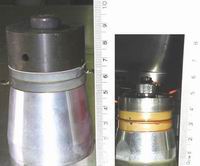Ultrasonic cleaning
File:Ultrasonic cleaning of a mobile phone.webm
Ultrasonic cleaning is a process that uses ultrasound (usually from 20–40 kHz) and an appropriate cleaning solvent (sometimes ordinary tap water) to clean items. The ultrasound can be used with just water, but use of a solvent appropriate for the item to be cleaned and the type of soiling present enhances the effect. Cleaning normally lasts between three and six minutes, but can also exceed 20 minutes, depending on the object to be cleaned.
Principle[edit | edit source]
Ultrasonic cleaning is based on the principle of cavitation. Cavitation bubbles are formed by the high-frequency sound waves in the cleaning solution. These bubbles collapse with great energy, creating a scrubbing action on the surface of the item being cleaned. This action penetrates blind holes, cracks, and recesses.
Equipment[edit | edit source]
The main components of an ultrasonic cleaner include:
- A transducer that converts electrical energy into high-frequency sound waves.
- A tank to hold the cleaning solution and the items to be cleaned.
- A generator to produce the electrical signal that drives the transducer.
Applications[edit | edit source]
Ultrasonic cleaning is used in a variety of industries, including:
- Medical device cleaning
- Dental instrument cleaning
- Jewelry cleaning
- Automotive parts cleaning
- Electronics cleaning
Advantages[edit | edit source]
- Effective at removing contaminants from complex surfaces.
- Reduces the need for manual scrubbing.
- Can clean delicate items without damage.
- Environmentally friendly when using water-based solutions.
Disadvantages[edit | edit source]
- Initial cost of equipment can be high.
- Not suitable for all materials (e.g., some soft metals and certain plastics).
Related Pages[edit | edit source]
Categories[edit | edit source]
This cleaning related article is a stub. You can help WikiMD by expanding it.
Search WikiMD
Ad.Tired of being Overweight? Try W8MD's physician weight loss program.
Semaglutide (Ozempic / Wegovy and Tirzepatide (Mounjaro / Zepbound) available.
Advertise on WikiMD
|
WikiMD's Wellness Encyclopedia |
| Let Food Be Thy Medicine Medicine Thy Food - Hippocrates |
Translate this page: - East Asian
中文,
日本,
한국어,
South Asian
हिन्दी,
தமிழ்,
తెలుగు,
Urdu,
ಕನ್ನಡ,
Southeast Asian
Indonesian,
Vietnamese,
Thai,
မြန်မာဘာသာ,
বাংলা
European
español,
Deutsch,
français,
Greek,
português do Brasil,
polski,
română,
русский,
Nederlands,
norsk,
svenska,
suomi,
Italian
Middle Eastern & African
عربى,
Turkish,
Persian,
Hebrew,
Afrikaans,
isiZulu,
Kiswahili,
Other
Bulgarian,
Hungarian,
Czech,
Swedish,
മലയാളം,
मराठी,
ਪੰਜਾਬੀ,
ગુજરાતી,
Portuguese,
Ukrainian
Medical Disclaimer: WikiMD is not a substitute for professional medical advice. The information on WikiMD is provided as an information resource only, may be incorrect, outdated or misleading, and is not to be used or relied on for any diagnostic or treatment purposes. Please consult your health care provider before making any healthcare decisions or for guidance about a specific medical condition. WikiMD expressly disclaims responsibility, and shall have no liability, for any damages, loss, injury, or liability whatsoever suffered as a result of your reliance on the information contained in this site. By visiting this site you agree to the foregoing terms and conditions, which may from time to time be changed or supplemented by WikiMD. If you do not agree to the foregoing terms and conditions, you should not enter or use this site. See full disclaimer.
Credits:Most images are courtesy of Wikimedia commons, and templates, categories Wikipedia, licensed under CC BY SA or similar.
Contributors: Prab R. Tumpati, MD


